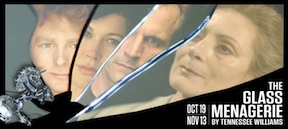CYGNET’S GLASS MENAGERIE SPARKLES
It is easy to see why Tennessee Williams’ The Glass Menagerie was an immediate hit when it debuted in 1944. In an era of everyone keeping up appearances, hiding any real pains at home, personal struggles could make one feel painfully alone. Williams gave the masses a chance to sneak a look at the inner hidden conflicts behind someone else’s front door − whether in horror or commiseration.
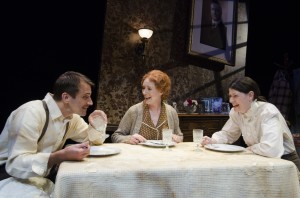 So why is a fine production of Menagerie, as Cygnet has staged, still mesmerizing’¦in days when reality TV shows us more than we ought to know about “Real Housewives” and when Kim Kardashian tweets every time she flushes a toilet? It works because it connects with us on such universal themes as fear, loss, longing, striving, and guilt. Hardly qualities unique to the 1940s, yet all the more compelling with quality period costuming by Shirley Pierson and suitable set design by Andy Hull, we not only peek behind the Wingfield family’s door but back in time as well.
So why is a fine production of Menagerie, as Cygnet has staged, still mesmerizing’¦in days when reality TV shows us more than we ought to know about “Real Housewives” and when Kim Kardashian tweets every time she flushes a toilet? It works because it connects with us on such universal themes as fear, loss, longing, striving, and guilt. Hardly qualities unique to the 1940s, yet all the more compelling with quality period costuming by Shirley Pierson and suitable set design by Andy Hull, we not only peek behind the Wingfield family’s door but back in time as well.
Local treasure Rosina Reynolds, one of San Diego’s most ubiquitous director/actresses, never disappoints as Amanda Wingfield, the aging southern belle whose glory days faded when she married the wrong man − whose enormous portrait looms over the family he abandoned. Reynolds’ ability to swap quickly from the nagging, pushy mother to the overly-gracious hostess is delectable. 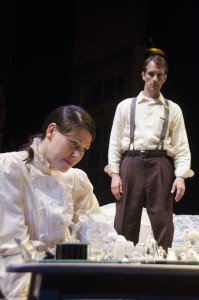 Watching Amanda mesmerize herself with stories of the grand South, Reynolds had the audience chuckling along through the famous monologue about her youthful fixation with jonquils. Indeed, Reynolds makes the strongest impression by intermission.
Watching Amanda mesmerize herself with stories of the grand South, Reynolds had the audience chuckling along through the famous monologue about her youthful fixation with jonquils. Indeed, Reynolds makes the strongest impression by intermission.
Delightfully, though, in Act II, Amanda Sitton becomes equally memorable and thoroughly enthralling as the withdrawn, hypersensitive daughter Laura, who is more fragile than the crystal animal figurines she delicately plays with, both for pleasure and escapism. “Fragile” is the word classically used to describe Laura, but Sitton adds an edge to Laura that makes her more damaged than merely fragile, and the result is powerful. It is left to us to decide whether that damage was innate or something caused by her handicap (a mild limp) or, perhaps, from simply being the daughter of Amanda Wingfield. Whatever the cause, there are no “gentleman callers” for Laura, something Amanda cannot abide by.
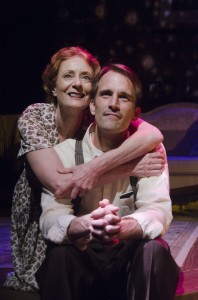 Sean Murray’s excellent direction commences with our protagonist, Amanda’s son Tom (Francis Gercke), typing out the story of his life. The initial scenes keep Tom seated, far stage left, at his typewriter while Amanda and Laura talk to an empty chair, stage right, that he is supposedly sitting in − an homage to the fact that Menagerie is semi-autobiographical, with Williams himself at the typewriter. In good time, Tom leaves the typewriter , seamlessly taking his place “back in time” among the family members. Gercke, mild for much of act one, allows Amanda’s character to shine, coming boldly to life in a fine performance when he rails against her. Tom struggles to express his desperate need for more adventure than he can find in his daily work or nightly disappearances to the movies.
Sean Murray’s excellent direction commences with our protagonist, Amanda’s son Tom (Francis Gercke), typing out the story of his life. The initial scenes keep Tom seated, far stage left, at his typewriter while Amanda and Laura talk to an empty chair, stage right, that he is supposedly sitting in − an homage to the fact that Menagerie is semi-autobiographical, with Williams himself at the typewriter. In good time, Tom leaves the typewriter , seamlessly taking his place “back in time” among the family members. Gercke, mild for much of act one, allows Amanda’s character to shine, coming boldly to life in a fine performance when he rails against her. Tom struggles to express his desperate need for more adventure than he can find in his daily work or nightly disappearances to the movies.
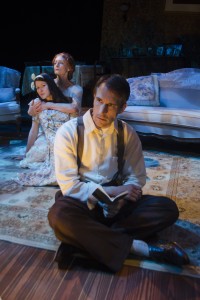 Rounding out the cast is Brian Mackey as genial Jim O’Connor, unknowingly invited by Tom to be Laura’s one gentleman caller. Mackey adds a playfulness to Jim that has the audience laughing in moments that could have been directed in less enjoyable ways.
Rounding out the cast is Brian Mackey as genial Jim O’Connor, unknowingly invited by Tom to be Laura’s one gentleman caller. Mackey adds a playfulness to Jim that has the audience laughing in moments that could have been directed in less enjoyable ways.
The history of this play, from mid-1930s drafts to its grand debut in 1944, makes for interesting side reading − with almost as much drama for Williams backstage as in the play itself. Cygnet delivered the drama onstage with a commendably slow, Southern tenderness.
.
photos by J.T. MacMillan
The Glass Menagerie
Cygnet Theatre at The Old Town Theatre
scheduled to end on November 13
for tickets, visit http://www.cygnettheatre.com
